Key takeaways
- Aristotle emphasizes virtue as a balance between extremes, encouraging moderation in personal and professional life.
- Habituation is key to developing character and ethics, demonstrating that virtues are shaped through consistent practice, not inherent traits.
- True happiness, or eudaimonia, is achieved through living a life aligned with purpose and virtue rather than seeking fleeting pleasures.
- Ethics education enhances critical thinking and encourages thoughtful deliberation in complex moral situations, making philosophy relevant to everyday choices.
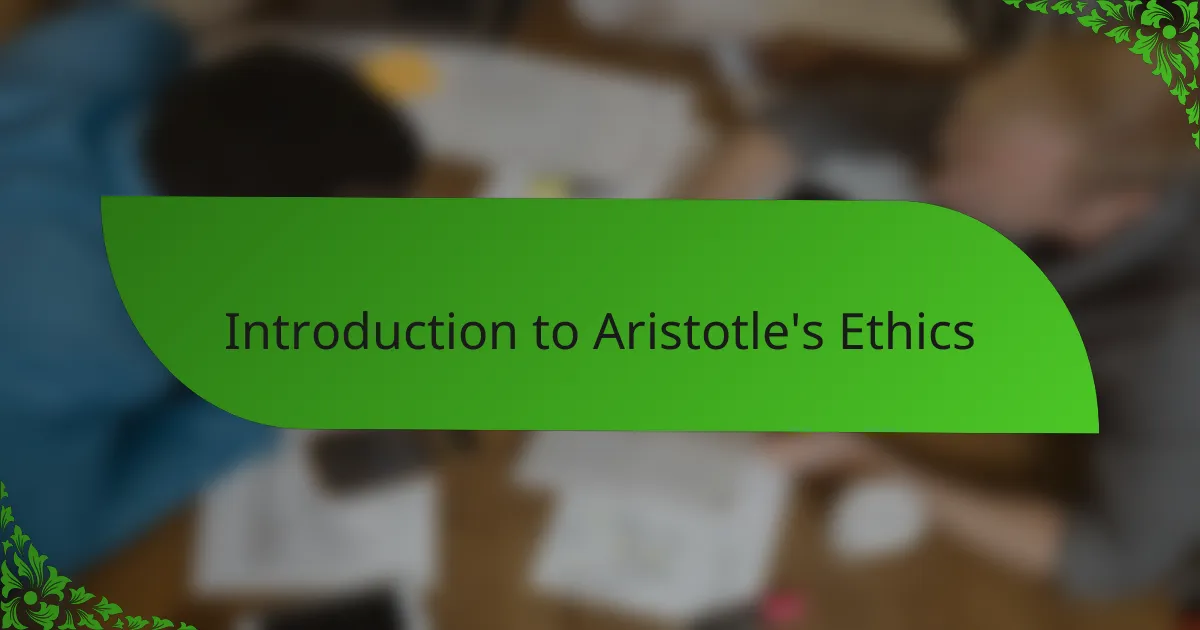
Introduction to Aristotle’s Ethics
Aristotle’s Ethics has always fascinated me because it speaks directly to everyday life rather than abstract ideals. Have you ever wondered what it truly means to live a good life? For Aristotle, ethics is not about rigid rules but about developing good habits and character.
What resonates most with me is Aristotle’s idea of virtue as a balance—a “mean” between extremes. It made me reflect on moments when I had to find moderation and avoid excess, whether in my work or personal relationships. This practical approach makes ethics feel alive and relevant.
I also appreciate how Aristotle connects happiness with fulfillment, not mere pleasure. It challenges us to think deeper about what satisfaction really means. Could focusing on virtue and purpose bring us a more lasting joy? That question has deeply influenced how I view my own goals and decisions.
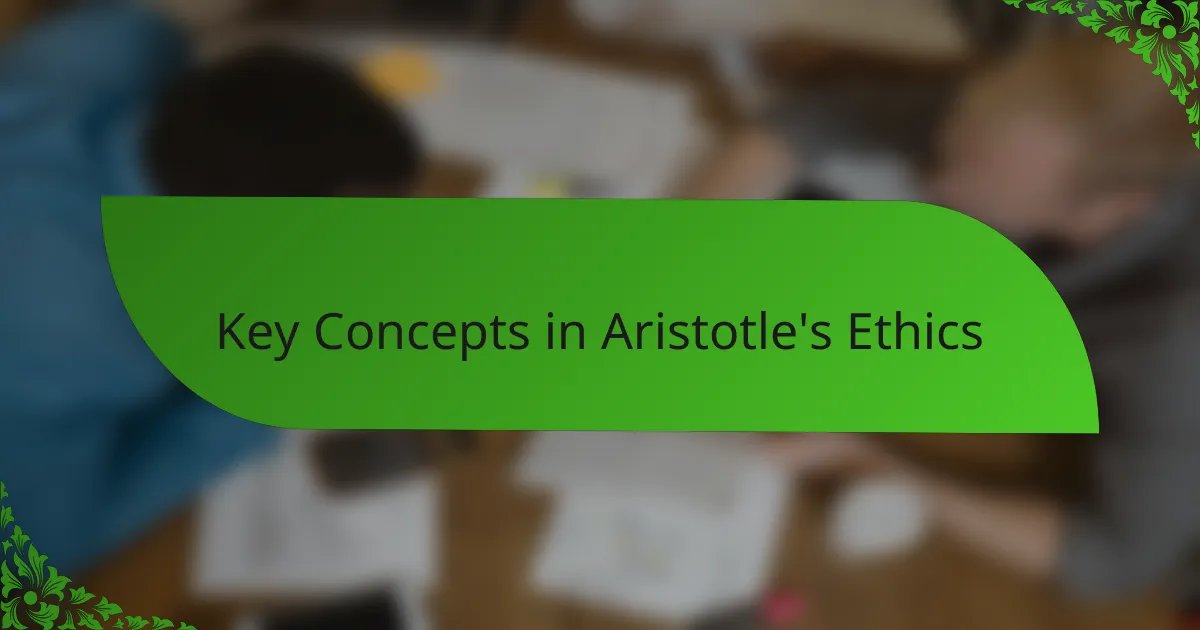
Key Concepts in Aristotle’s Ethics
One core idea that caught my attention is Aristotle’s concept of virtue as a “mean” between extremes. It made me realize how often I swing too far in one direction—whether being overly cautious or too reckless—and how important it is to find that balanced middle ground. Have you ever noticed moments when just a little more patience or courage made all the difference?
Another key concept is the role of habituation in shaping our character. Aristotle argues that virtues aren’t innate but developed through consistent practice, which reminded me of how habits in my own life gradually changed how I respond to challenges. It’s empowering to think that ethics isn’t about perfection but about continuous effort.
Finally, Aristotle’s focus on eudaimonia, often translated as flourishing or happiness, feels deeply human to me. It’s not about fleeting pleasures but living a life aligned with purpose and virtue. Have you ever felt that true contentment comes from being the kind of person you admire? That’s exactly what Aristotle’s ethics invite us to pursue.
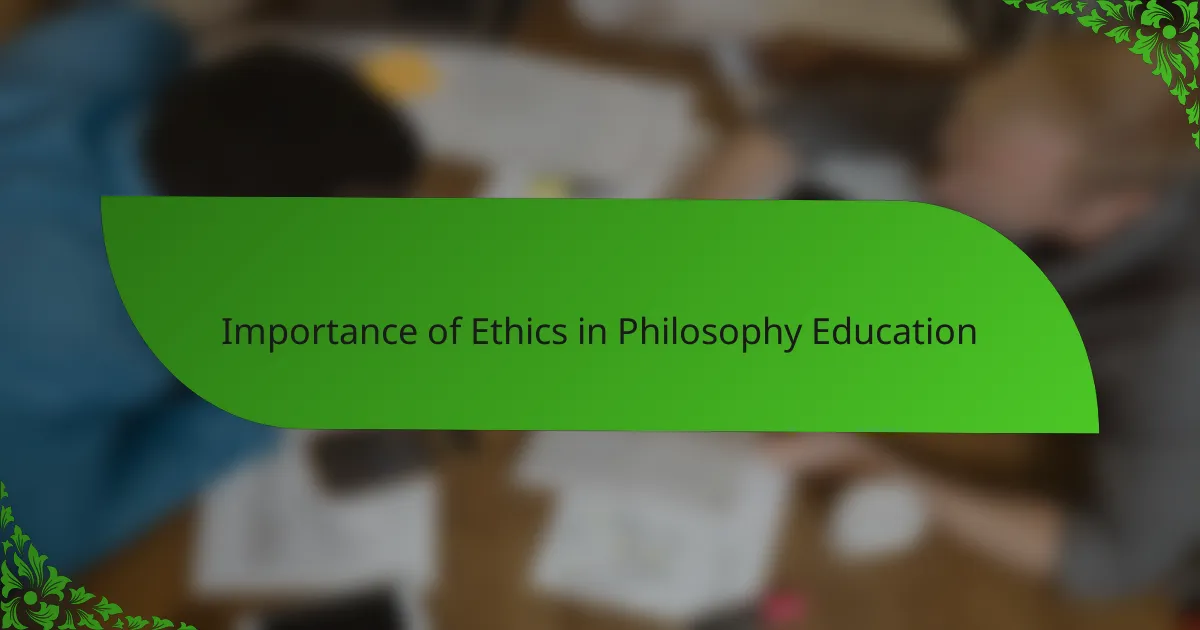
Importance of Ethics in Philosophy Education
Ethics forms the backbone of philosophy education because it pushes us to question not just what we think, but how we choose to live. From my experience, grappling with ethical ideas challenges me to examine my values and actions more honestly. Have you ever paused in a heated moment to consider what the right thing truly is? That pause, I believe, is where philosophy becomes deeply practical.
In learning ethics, I found that it’s not just about memorizing concepts but about transforming how I approach life’s dilemmas. Ethics education encourages a mindset where decisions are weighed not only by logic but by character and empathy. This shift has made my philosophical studies feel less abstract and more connected to everyday choices, which I think is essential for meaningful learning.
Moreover, ethics in philosophy fosters critical thinking that’s relevant beyond the classroom. It invites us to navigate complex moral situations without easy answers, honing skills I still rely on when faced with uncertainty. Don’t you think that being able to deliberate thoughtfully about right and wrong is one of the most valuable tools philosophy offers? For me, it certainly is.
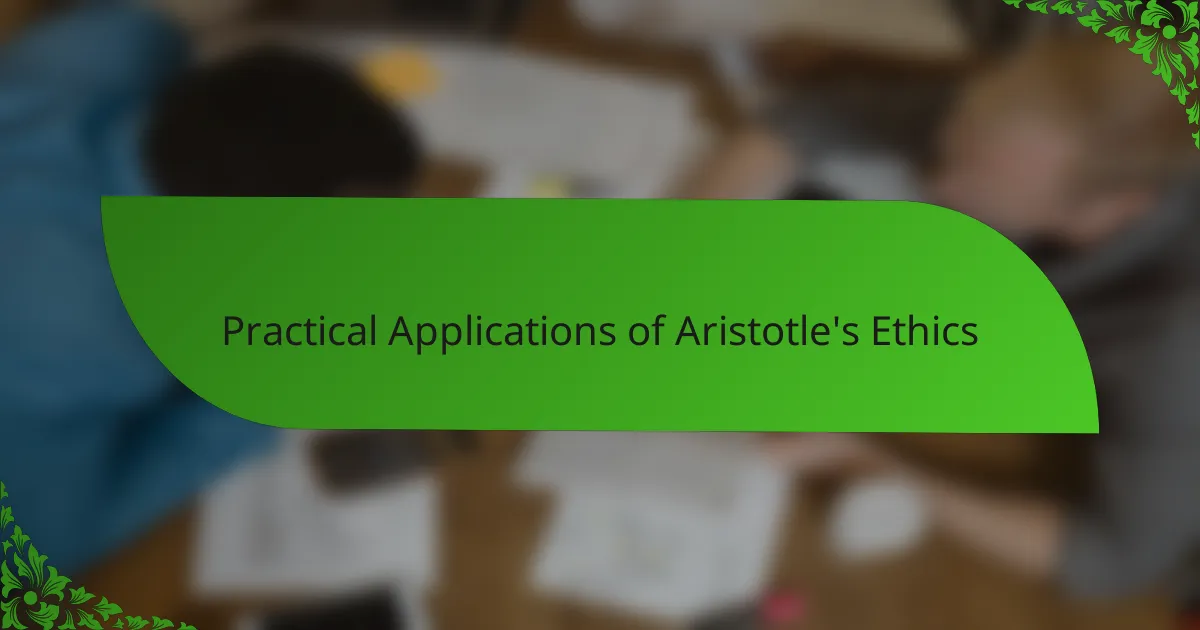
Practical Applications of Aristotle’s Ethics
When I apply Aristotle’s ethics in daily life, I often find myself striving for that elusive balance he calls the “mean.” For example, at work, I’ve noticed how pushing too hard can lead to burnout, but being too passive stalls progress. It’s this idea of moderation that helps me navigate challenges with a clearer, more grounded mindset.
Another practical takeaway is Aristotle’s emphasis on habituation—virtue as something built through repeated action. I remember when I consciously practiced patience during stressful family gatherings; over time, it felt less like a struggle and more like second nature. This shows me that ethics isn’t some distant ideal but a living practice that shapes who we become.
Have you ever wondered how Aristotle’s idea of flourishing fits into your own ambitions? For me, it means aligning what I do with what I value most, not just chasing short-term wins. It’s a reminder that ethical living, according to Aristotle, is about crafting a fulfilling, meaningful life every single day.
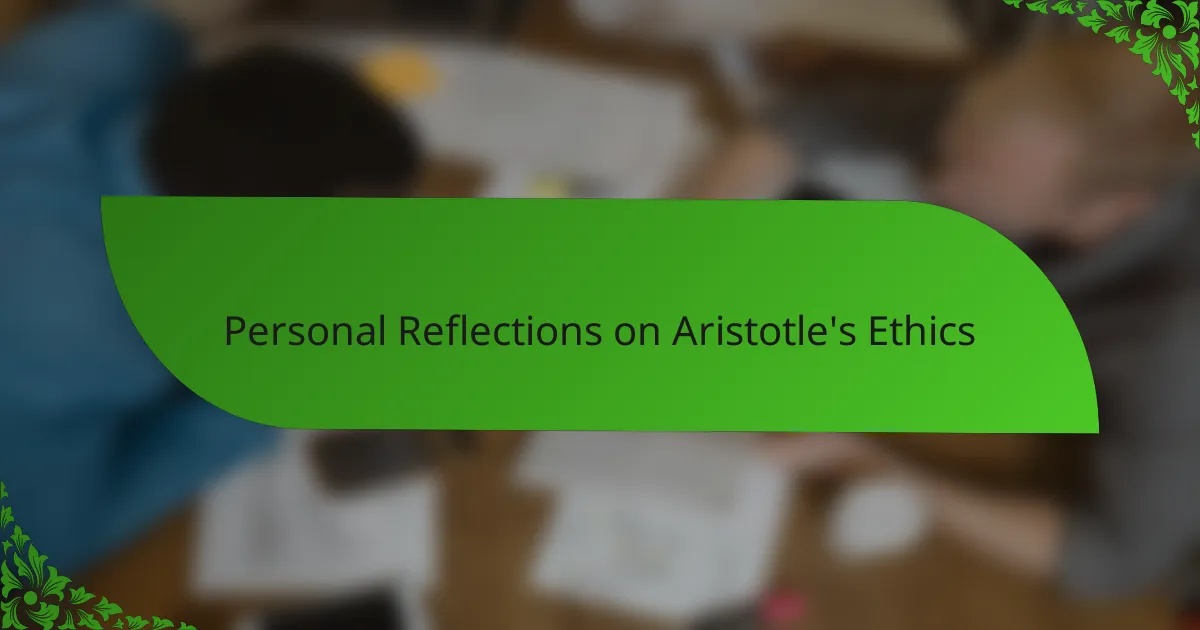
Personal Reflections on Aristotle’s Ethics
Reflecting on Aristotle’s ethics, I find myself drawn to how his concept of virtue challenges me personally. There have been times when I realized my actions were skewed toward extremes—either being overly cautious or too impulsive—and Aristotle’s idea of the “mean” helped me see the value of balance in those moments. Have you ever caught yourself swinging between two extremes and wished for a clearer middle path? That’s exactly where his ethics feel most alive to me.
I also think about how Aristotle’s emphasis on habituation transformed my approach to self-improvement. Instead of trying to be perfect overnight, I started focusing on small, consistent actions—like consciously practicing patience or honesty—which gradually reshaped my character. This gradual process made ethics feel less like a distant ideal and more like a practical journey I could actively engage in. Isn’t that a comforting thought, that virtue grows with each deliberate choice?
What resonates deeply is Aristotle’s view of happiness as flourishing through virtuous living rather than fleeting pleasure. It questions the common chase for quick satisfaction and invites me to reflect on what truly brings lasting contentment. When was the last time you felt genuinely fulfilled by simply being the person you aspire to be, instead of by what you have or achieve? For me, that realization continues to shape how I set goals and prioritize my life.
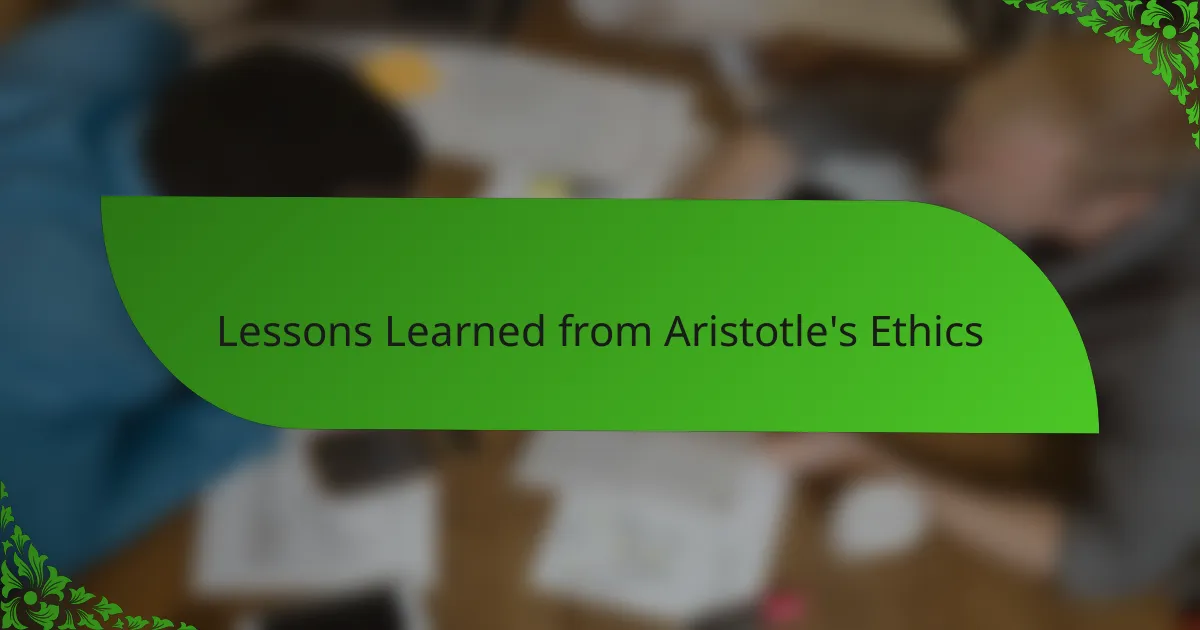
Lessons Learned from Aristotle’s Ethics
One of the most striking lessons I’ve taken from Aristotle’s ethics is the idea that virtue lies in finding a balance. I’ve caught myself leaning too far in one direction, whether being too rigid or overly lenient, and this concept reminds me to pause and seek that middle ground. Have you noticed how life’s challenges often ask us to calibrate, not just to choose extremes?
Another insight is how ethics isn’t about overnight transformation but steady practice. I recall times when I deliberately worked on patience, and though it felt tough initially, over time it became almost automatic. This habit-building approach made ethics feel approachable—like a skill I could develop instead of an impossible standard I had to instantly meet.
Lastly, Aristotle’s link between virtue and true happiness resonates deeply with me. It pushes me to question whether the pursuits I value today will lead to lasting fulfillment or just temporary pleasure. When was the last time you felt genuinely joyful by acting in line with your core values, rather than chasing momentary rewards? That question has reshaped how I view success and meaning in my own life.
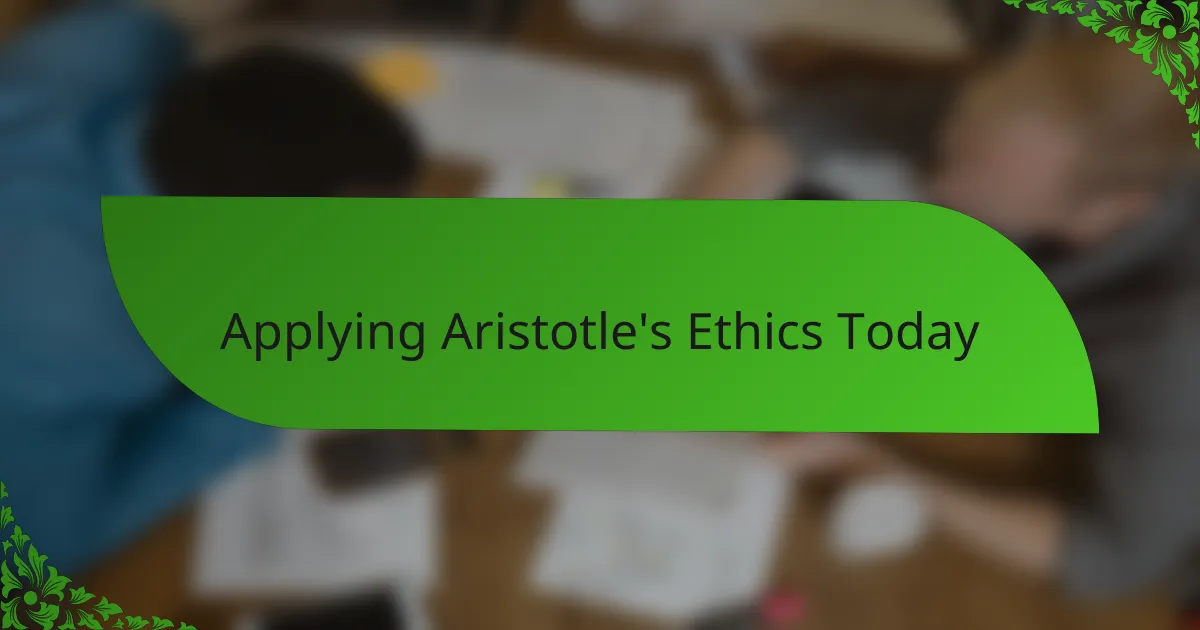
Applying Aristotle’s Ethics Today
Applying Aristotle’s ethics today often feels like a gentle reminder to pause and find balance in our fast-paced lives. I’ve noticed that when stress hits, it’s easy to swing toward extremes—either pushing too hard or shutting down completely. Aristotle’s idea of the “mean” nudges me to look for that middle path, which, honestly, makes everyday decisions feel less overwhelming.
What’s really stuck with me is how ethics isn’t about perfection but about practice. When I intentionally cultivated kindness in small, repeated moments—like offering a genuine compliment or listening carefully—it gradually reshaped how I relate to others. It’s empowering to think that virtue grows not from grand gestures but from tiny, consistent acts.
And then there’s Aristotle’s vision of flourishing—living a life aligned with purpose rather than fleeting pleasures. I’ve found that asking myself whether my daily choices contribute to genuine fulfillment helps me steer away from distractions. Have you ever felt that quiet satisfaction that comes from knowing you’re acting in harmony with your values? For me, that’s the heart of applying Aristotle’s ethics today.